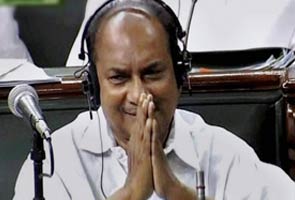 New Delhi, Sep 6: Rubbishing reports that China has occupied Indian territory in Ladakh, defence minister A K Antony on Friday asserted that there is no question of ceding any part of the country and all steps are being taken to safeguard national security.
New Delhi, Sep 6: Rubbishing reports that China has occupied Indian territory in Ladakh, defence minister A K Antony on Friday asserted that there is no question of ceding any part of the country and all steps are being taken to safeguard national security.
His statement in Lok Sabha came amidst attack by opposition BJP and UPA ally Samajwadi Party members, who said a high-level committee of the government had reported that China had occupied 640 sq km of Indian territory in Ladakh sector.
The members were not satisfied with Antony's statement and created uproar. While BJP members were on their feet, SP members trooped into the well, creating din which led Speaker Meira Kumar to adjourn the House for an hour.
Antony said National Security Advisory Board chairman Shyam Saran had visited Ladakh from August 2 to 9 and submitted a report on the border infrastructure there.
"I would like to categorically state that Saran has not stated in his report that China has occupied, or has denied access to India to any part of Indian territory. I would like to assure the House that there is no question of India ceding to China any part of Indian territory," Antony said.
He said the government has taken "all necessary measures to safeguard India's security and would continue to strengthen our capabilities in border areas to protect our national interest."
The report by Saran, Antony said, focuses on border infrastructure but also deals with several aspects relating to the region covering a broad spectrum of activities and requirements.
He said Saran's report also deals with requirement of air facilities in Ladakh region along with matters relating to land acquisition and environmental and wildlife clearances.
"The report reviews the progress in development of border infrastructure required to ensure connectivity between Ladakh and neighbouring areas. In this context, issues such as availability of
modern machinery for construction and maintenance and upgradation of roads, tunneling and alternate alignments," Antony said.
"Matters such as employment opportunities to local youth, tourism, mobile and internet connectivity, law and order, better equipment and facilities for ITBP, certain grievances of local people, among others have been covered in the report," he said.
Immediately after Antony read out the statement, SP members trooped into the well and BJP members were on their feet in protest, terming the contents as "incorrect".
The Speaker repeatedly told the agitated members that a discussion could be held if they gave proper notice. "I have to follow the rules and the rules say there will be no discussion."
In the din, BJP leader Yashwant Sinha and SP chief Mulayam Singh Yadav tried to say something but could not be heard. As the protests continued, Kumar adjourned the House for over an hour.
Earlier, Sinha while demanding a statement on the issue said, "This is a serious matter of national security. We had demanded that the defence minister make a statement on the Chinese incursions."
The SP chief also expressed concern over the issue and charged the government with being "coward" and "good for nothing".
"For last 14 years, I have been saying inside and outside Parliament that China will attack India. It had betrayed Jawaharlal Nehru and this shock had led to his death. You discuss the issue of border security and we will be satisfied and not raise economic and price rise issues," he said.





Comments
Add new comment